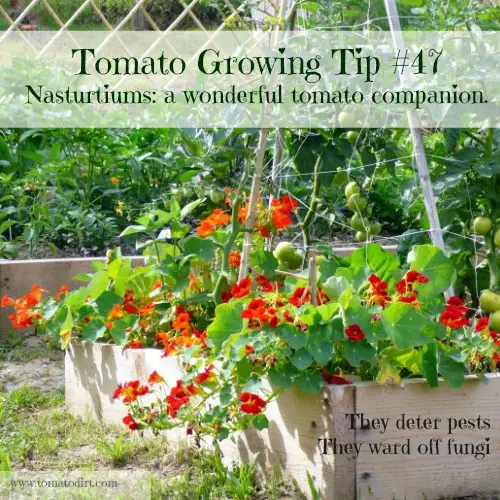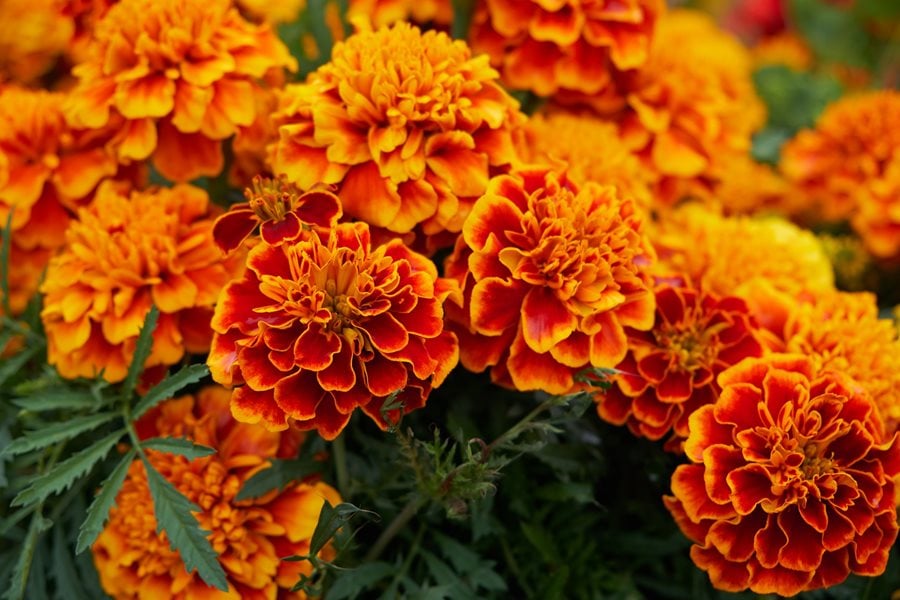Amazing Companion Plants That Will Make Your Tomatoes Thrive
Amazing Companion Plants That Will Make Your Tomatoes Thrive
Tomatoes are one of the most popular vegetables to grow in the garden, and for good reason. They're delicious, versatile, and relatively easy to care for. But did you know that there are certain companion plants that can help your tomatoes thrive?
Companion planting is the practice of planting different types of plants together in order to benefit each other. Some companion plants attract beneficial insects, while others help to repel pests. Some improve the soil quality, while others provide shade or windbreak.
When it comes to tomatoes, there are a number of companion plants that can help them to grow better. Here are a few of the best:
- Marigolds: Marigolds are a popular companion plant for tomatoes because they help to repel pests, such as aphids, whiteflies, and nematodes. They also attract beneficial insects, such as ladybugs and lacewings.
- Basil: Basil is another great companion plant for tomatoes. It helps to improve the flavor of tomatoes, and it also helps to deter pests. Basil also attracts pollinators, such as bees and butterflies.
- Chives: Chives are a member of the allium family, and they have a strong scent that helps to repel pests. They also help to improve the soil quality, and they can be used as a culinary herb.
- Onions: Onions are another member of the allium family, and they have similar benefits to chives. They help to repel pests, improve the soil quality, and they can be used as a culinary herb.
- Garlic: Garlic is another allium that is beneficial to tomatoes. It helps to repel pests, improve the soil quality, and it also has medicinal properties.
- Nasturtiums: Nasturtiums are a colorful flower that is also a good companion plant for tomatoes. They help to attract beneficial insects, such as ladybugs and lacewings. They also deter pests, such as aphids and whiteflies.

- Borage: Borage is a flowering herb that is beneficial to tomatoes in a number of ways. It helps to attract pollinators, such as bees and butterflies. It also helps to improve the soil quality, and it can be used as a culinary herb.
- Asparagus: Asparagus is a surprising companion plant for tomatoes, but it actually works well. Asparagus helps to deter asparagus beetles, which can be a major pest for tomatoes.
These are just a few of the many companion plants that can help your tomatoes thrive. When choosing companion plants, it's important to consider the specific needs of your tomatoes. For example, if you're growing tomatoes in a hot climate, you'll want to choose companion plants that can tolerate heat.
By planting the right companion plants, you can help your tomatoes to grow healthier, tastier, and more productive. So next time you're planning your tomato garden, be sure to consider some of these beneficial plants.
Are you growing tomatoes in your garden this year? If so, you may be wondering what are the best companion plants for tomatoes. Companion planting is a gardening technique that involves planting certain plants together to benefit each other. For tomatoes, there are a number of great companion plants that can help improve their growth, flavor, and pest resistance.
Some of the best companion plants for tomatoes include:
- Basil: Basil is a classic companion plant for tomatoes, and for good reason. Basil helps to improve the flavor of tomatoes, and it also helps to repel pests like aphids and tomato hornworms.
- Marigolds: Marigolds are another great companion plant for tomatoes. They help to repel pests like nematodes, whiteflies, and tomato hornworms.

- Beans: Beans are nitrogen-fixing plants, which means they can help to improve the soil quality for tomatoes. They also help to provide shade for tomatoes, which can help to protect them from the sun.
-(2).jpg)
- Carrots: Carrots help to attract beneficial insects like ladybugs, which can help to control pests that attack tomatoes.
- Peas: Peas are another nitrogen-fixing plant that can help to improve the soil quality for tomatoes. They also help to provide shade for tomatoes, which can help to protect them from the sun.
If you're looking for more information about companion planting for tomatoes, I recommend visiting Gardenia Inspiration. This website has a wealth of information on the topic, including a list of the best companion plants for tomatoes, as well as tips on how to plant them together.
FAQ of good companion for tomatoes
Question 1: What are some good companion plants for tomatoes?
Answer: There are many good companion plants for tomatoes, but some of the most popular include:
- Marigolds: Marigolds are a great companion plant for tomatoes because they help to repel pests like tomato hornworms and aphids.
- Basil: Basil is another great companion plant for tomatoes because it helps to improve the flavor of the tomatoes.
- Chives: Chives help to deter pests and attract beneficial insects like ladybugs.
- Onions: Onions help to repel nematodes, which are a common pest of tomatoes.
- Garlic: Garlic helps to repel pests and improve the flavor of the tomatoes.
Question 2: What are some plants that should not be planted near tomatoes?
Answer: There are a few plants that should not be planted near tomatoes, as they can compete for nutrients or attract pests. These plants include:
- Potatoes: Potatoes and tomatoes are both members of the nightshade family, and planting them together can increase the risk of diseases.
- Cucumbers: Cucumbers and tomatoes have similar water and nutrient requirements, so planting them together can lead to competition.
- Melons: Melons and tomatoes have similar water and nutrient requirements, so planting them together can lead to competition.
- Eggplant: Eggplant and tomatoes have similar water and nutrient requirements, so planting them together can lead to competition.

Question 3: How do companion plants benefit tomatoes?
Answer: Companion plants can benefit tomatoes in a number of ways, including:
- Reducing pests: Some companion plants, such as marigolds and chives, help to repel pests that can damage tomatoes.
- Improving flavor: Some companion plants, such as basil, can improve the flavor of tomatoes.
- Attracting beneficial insects: Some companion plants, such as lavender and nasturtiums, attract beneficial insects that help to control pests.
- Providing nutrients: Some companion plants, such as beans and peas, can fix nitrogen in the soil, which can benefit tomatoes.
Question 4: How far apart should companion plants be planted from tomatoes?
Answer: The distance that companion plants should be planted from tomatoes depends on the size of the plants. In general, you should plant companion plants at least 12 inches away from tomatoes.
Question 5: How do I know if I have planted the right companion plants for my tomatoes?
Answer: There are a few things you can look for to see if you have planted the right companion plants for your tomatoes. These include:
- The plants should not be competing for nutrients or water.
- The plants should not be attracting pests that can damage tomatoes.
- The plants should be helping to improve the flavor of the tomatoes.
If you are unsure whether you have planted the right companion plants for your tomatoes, you can always consult with a gardening expert.
Image of good companion for tomatoes
- Basil: Basil is a classic companion plant for tomatoes. It helps to deter pests and attract pollinators.
- Chives: Chives also help to deter pests and attract pollinators. They can also be used to flavor tomato dishes.
- Marigolds: Marigolds are another great companion plant for tomatoes. They help to repel nematodes, which are a common pest of tomatoes.
- Nasturtiums: Nasturtiums are not only beautiful, but they also help to deter pests. They can also be used to make a delicious pesto.

- Onions: Onions are a good companion plant for tomatoes because they help to improve the flavor of the tomatoes. They can also help to deter pests.
Post a Comment for " Amazing Companion Plants That Will Make Your Tomatoes Thrive"